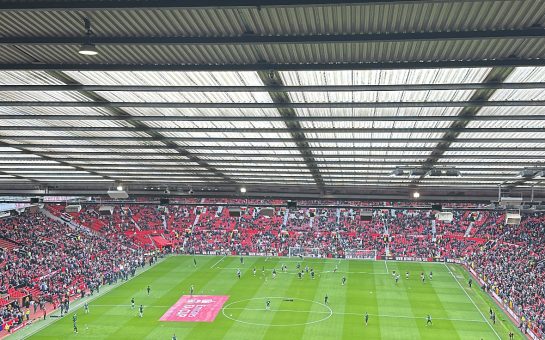As speculation builds that Oldham Athletic’s signing of convicted rapist Ched Evans is ‘imminent’, an MM reporter explores the negative societal implications of his return to football.
Please note this is a comment piece.
An Oldham sponsor, Verlin Rainwater Solutions, has severed ties with The Latics due to their belief Evans will definitely be taken on as the latest member of the team.
The League One club are expected to make a statement regarding the 26-year-old striker’s future on Thursday or Friday.
Evans was released from prison in October 2014 having served just half of a five-year sentence for raping a 19-year-old woman in May 2011.
Since his release, there has been vociferous debate on whether he should or should not be allowed to return to professional football.
Just yesterday, our own reporter James Gray argued in our weekly Tuesday Team Talk that not letting Ched Evans play football again to punish him further would undermine our judicial system.
Like James, there are those arguing in favour of his rehabilitation in his chosen career and on the other, people pointing to an incidental moral responsibility of those playing at professional level.
However, one certainty this argument has brought to light is the existence of a wider social problem, as with startling regularity the Evans discussion has been punctuated with expressions of disgusting, misogynistic vulgarity and threats of rape.
Evans, himself, has effectively become synonymous with rape, his name being used as a verb on social media – repulsive slang ‘joking’ about raping a woman.
Lads saying they’ll do a “Ched Evans” on girls is exactly why that rapist scumbag should NEVER work in the public eye pic.twitter.com/AhB1UYiobK
— YA Okay! (@y_a_ok) January 3, 2015
Jessica Ennis-Hill, beloved British heptathlete and London 2012 golden girl, received rape threats after she said she would request the removal of her name from a stand at Sheffield United if the club offered Evans a new contract.
The victim, meanwhile, has had to change her name and move house five times, as she has been identified and constantly tormented by Evans’ supporters.
Sexual offences in the UK recorded by the police between July 2013 and June 2014 saw a 21% increase from the previous year –a rise not accounting for unreported cases – and may rise again.
These threats, these patterns of speech and these crimes are all a sign of the worrying normalisation of sexual violence towards women, or ‘rape culture’, which is increasingly pervasive these days.
As men, we have a duty to say ‘no’ to this culture, and to do what we can to stand up for our mothers, sisters, daughters and friends and make them feel as safe as they deserve to be.
The privileged position professional athletes, and especially footballers, enjoy as role models, perhaps bestows on them an even greater duty to set a positive example.
They are cheered on the pitch, their faces adorn youngsters’ walls, and young people dream of growing up to be like them.
For better or worse, professional footballers, to varying degrees, provide examples to their fans.
If Oldham sign Evans it would endorse this culture and send a perturbing message to the young men and women looking up to professional athletes.
Allowing someone to take advantage of someone when they are intoxicated, to serve only half of their sentence, not even acknowledge the crime let alone show remorse for it, and return to a dream career, envied and admired by millions, sets a worrying precedent and reinforces ‘rape culture’.
This is not to suggest that Evans should not be allowed to reintegrate into society at all.
There are many jobs, community projects or rehabilitation programmes Evans could engage in as an alternative to playing professional football.
He would of course feel hard-done-by if this happened and those in favour of his return to football would argue he has served his time and should be allowed to continue with his life and that he is merely being made an example of.
Having only served half of his five-year sentence, it is only the custodial aspect that is over – he is still subject to a range of probation conditions.
Hypothetically, he would also not be allowed back into a number of other jobs – teacher, doctor, police officer, for example. In fact, MANY companies would not hire a convicted rapist after their release.
Why should football be different? And what is so wrong about making an example of him?
The Evans case has understandably produced heated debate in recent months and will most likely continue to do so as long as clubs such as Sheffield United, Hartlepool United and Oldham Athletic court the idea of signing him.
References to Evans in the press are habitually preceded by the term ‘convicted rapist’ and his name is grossly used as slang for rape.
In short, he represents a revolting social undercurrent in which sexual violence against women results only in minimised ill-effects for the attacker, while the victim lives with the torment and memory of what has happened.
Excluding him from an idolised career may go some way to undermining this trend.
Image courtesy of BBC via YouTube, with thanks.



